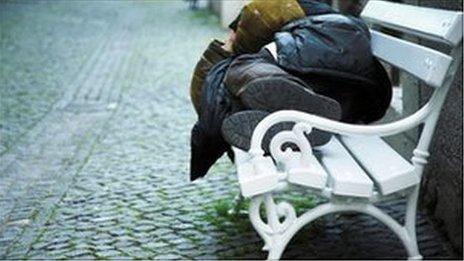Belfast homeless: At least five dead since January, says charity
- Published

Latest statistics indicate the number of homeless people in Belfast is rising
At least five people who have used homeless services in Belfast have died since the start of the year, a homeless charity has said.
There are no specific statistics on those who die during or after a period of homelessness.
However, the Welcome Organisation said rough sleepers are dying due to mental and physical illness caused or made worse by the harsh conditions.
The life expectancy of a homeless person is around 47 years.
There are no official statistics on fatalities on the streets and it is unclear in these latest cases what the causes of death might have been.
Historically, a range of issues are involved including exposure to the elements, drink and drug abuse and acute and at times untreated medical problems.
The number of people sleeping rough in Belfast is rising, according to latest statistics.
Latest figures, external show a slight increase in homelessness over the last five years.
However, front-line volunteers believe there are many more "hidden homeless" using their services without making themselves known to the authorities.
'Bureaucratic process'
All homeless people must register with the Housing Executive before they are able to apply for a bed in a hostel, though there is a limited number of beds in night shelters.
The registration process can take weeks.
This causes many homeless people, who often have mental health issues, poor literacy or fears over their safety, to remain on the streets with no government support, access to housing or healthcare.
Sandra Moore, director of homelessness services at the Welcome Organisation, said: "Homeless people find it much more difficult to fill out forms to access services and that can be a problem.
"The agencies in Belfast work very hard to ensure continual services and are always working towards change to ensure people not only get a roof over their heads but can also sustain that, which is a challenge.
"We're pushing for change, so people can get a roof over their heads while they go through the registration process.
Common causes
"It would save money in the long run because the quicker you get someone off the streets, the less care they need further down the road."
According to a report by homeless charity Crisis, one in 18 (5.7%) of all adults in Northern Ireland had said they had experienced homelessness of some kind, either having slept on the streets, in a hostel or someone else's home.
The report also indicated that the most common cause for homelessness was sharing breakdown or family dispute (22%), where a person has to leave accommodation after falling out with fellow tenants or family.
The second most common cause was loss of rented accommodation (15%). Mortgage default accounted for relatively few cases (5%) while domestic violence was the cause of 3% of homelessness.